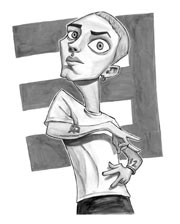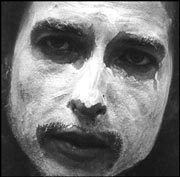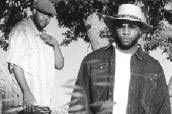ANGER MANAGEMENT TOUR
FEATURING EMINEM, PAPA ROACH, LUDACRIS, XZIBIT, X-ECUTIONERS
Tacoma Dome, $39.50
6:30 p.m. Tues., Aug. 6
High on the wish list of music industry events I long to observe—along with a Kajagoogoo-Chumbawumba-Oingo Boingo-Hoobastank tour (I just want to hear the radio spots)—is this: I’d like to see time given to showing us a rotating roster of M*A*J*O*R S*T*A*R*S in the raw.
Not naked, mind you. I get enough of that through my Hotmail account. What I mean is, I’d like to see the current year’s crop of stroke material in their unpeeled, unpainted, unmediated, unairbrushed, early-morn glory. Shakira with sleep crusts and split ends; Destiny’s Child with morning breath and unwaxed upper lips; Enrique Iglesias with clots of yesterday’s deodorant matted in his armpit hairs; and so forth.
This grotty daydream doesn’t arise from ill feelings toward the personages involved. It’s just that the parade of blas頰erfection among the nouveaux fabulous has finally gotten unreasonable.
Of course, the whole purpose of the fame machine is to sell us back our own fantasies, in which we are similarly radiant, powerful, confident, depilated, lusted after, miraculously wealthy, and physically flawless. That isn’t always a sinister project; after all, if a network’s flagship reality show were called When Fuel Pumps Need to Be Replaced or Your Demeaning Service Industry Job, what would be the point of tuning in?
This seems like a roundabout way to get into Eminem’s impact and dependence on the industry, the fantasy, and the fame machine all at once—but what is the very soul of Eminem’s allure, if not the divergence between image and reality?
No contemporary musical personality—not Prince, not even Madonna in her heyday—has played the media as shrewdly as Marshall Mathers. Prince was laughed off stage the moment he cipherized his name, and Madonna always needed the media’s complicity to realize her much-bruited “reinventions” (one gets the feeling that if the cameras were turned off, she’d simply disappear). In both cases, the personalities played it utterly straight; they wanted us to believe that they arrived fully formed, sui generis, and that the cameras had merely caught them being offhandedly brilliant.
Careening wildly among his trio of performers, Mathers/Slim/Eminem has never presented himself as anything but a media construction, a canny maneuver that has guided his development ever since The Slim Shady LP and its attendant charges of homophobia and misogyny.
By assuming variant personae as needed, Mathers has found a device to keep himself and his music in heavy rotation—and, truthfully, pretty much unchanged from his first album—while delivering a kind of metacommentary on the whole brouhaha.
The division isn’t simply one of nomenclature, though it’s pretty easy to suss out once you listen past the content. Eminem is the name he assumes when he wants to display his hip-hop chops (which are, it must be said, formidable). Slim Shady is the one who raps unconcernedly about faggots, his bitch of an ex, and his barely restrained violent urges. Marshall Mathers, loosed only occasionally, is the wide-eyed white kid who looks on his own success with a critical eye, professing to be confused and hurt by all the criticism.
By this point, however, it should be clear that Eminem has established a dramatic pattern—and it’s one that would never work in the underground scene from which he emerged.
On “Without Me,” the first single from The Eminem Show, he declares sympathy with “Little hellions, kids feeling rebellious/ embarrassed their parents still listen to Elvis.” Later, he correctly observes, “I’m not the first king of controversy/I am the worst thing since Elvis Presley/To do black music so selfishly/And use it to get myself wealthy.”
Try to imagine Madonna singing those last three lines—as she might have with complete honesty—and you begin to see how smartly Eminem has begun to second-guess his critics and the media’s interpretation of his product far in advance: “It feels so empty without me.”
The previously hot question—”Is that guy kidding or not?”—no longer matters. On The Eminem Show, as the title suggests, Mathers has succeeded in turning his controversial celebrity into broad parody. And in doing so, he’s beaten the machine, if only briefly; he’s moving faster than his own 15 minutes.
When he broadcasts his family psychodramas, when he describes Elton John’s “framed sunglasses on my GLAAD wall,” then contradicts himself by calling Moby a “bald-headed fag,” Eminem (or Shady or Mathers) revels in his shifting faces.
Despite what you may think of his act or his content, seen in that light, his popularity, particularly among teenage males, becomes more understandable. It’s not about the calculatedly offensive lyrics or even his remarkable flow. When the rest of our mainstream choices take their flawless selves so seriously, how refreshing it must be to hear a guy braying unapologetically about his own imperfections.
Or, as our teenage incarnations might have put it: He looks so ugly, just like me.









